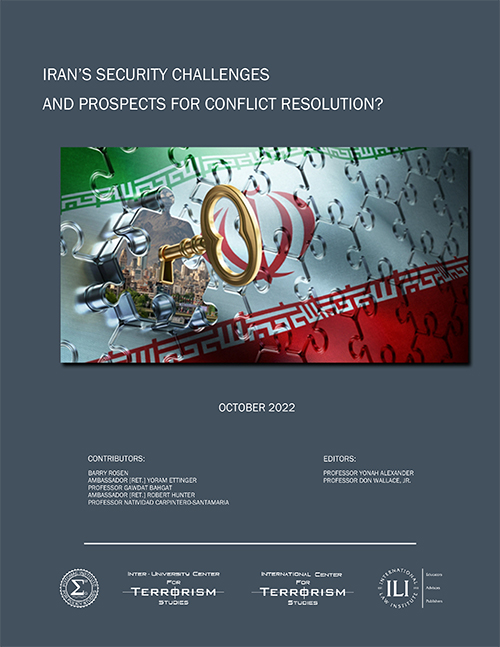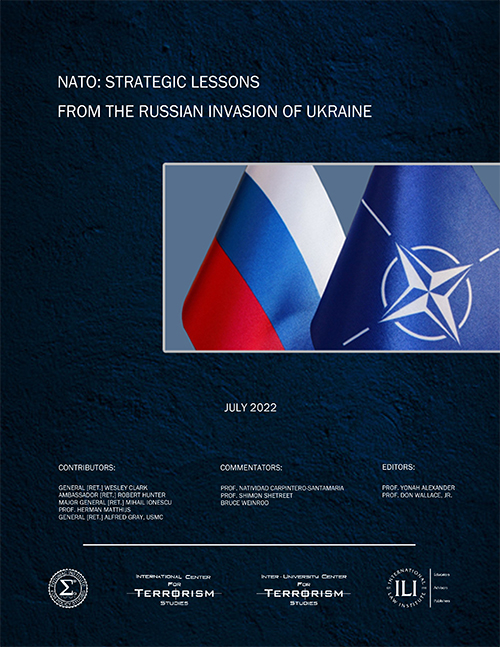Divisions
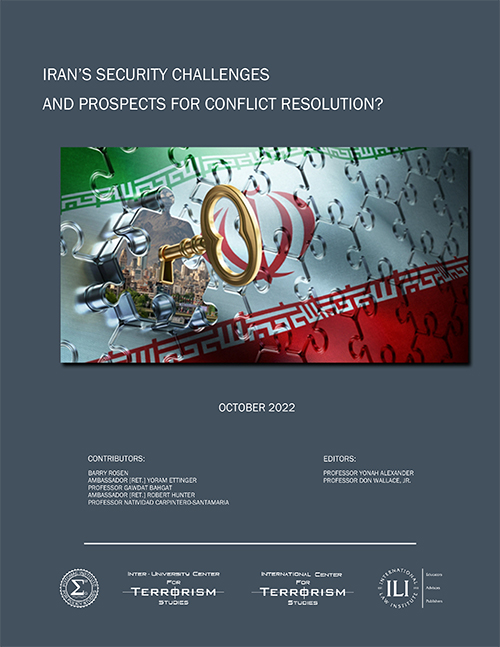 The rise of power in Iran of the Ayatollah Ruhollah Khomeini and the November 1979 seizure of the United States Embassy in Tehran and of some 60 American hostages by “revolutionary students” triggered a flurry of introspection in Washington concerning the policies which successive Administrations had followed with a country of enormous strategic and economic importance in the Middle East.
The rise of power in Iran of the Ayatollah Ruhollah Khomeini and the November 1979 seizure of the United States Embassy in Tehran and of some 60 American hostages by “revolutionary students” triggered a flurry of introspection in Washington concerning the policies which successive Administrations had followed with a country of enormous strategic and economic importance in the Middle East.
Among the questions that have been raised during that historical period were the following: What had gone wrong? Why had the United States failed to correctly assess the strength of the elements that brought down the Shah Shahanshah, King of Kings, Mohammed Reza Pahlavi in January 1979, after a 37-year rule? Why had the United States linked its fortunes so closely to those of the Shah in the first place? What did the national interests of the United States consist of as applied to Iran? What were the full implications of the transformation of Iran from a friendly ally to a hostile adversary of the United States?
These and related issues were analyzed in a study on The United States and Iran: A Documentary History, co- edited by Yonah Alexander and Allan Nanes and published by the University Publications of America in 1980. This work was prepared in association with the World Power Studies Program of the Center for Strategic and International Studies at Georgetown University.
During the next 43 years, extensive research efforts have been undertaken by the Inter-University Center for Terrorism Studies (IUCTS) and its academic partners such as the Potomac Institute for Policy Studies (PIPS) and the International Law Institute (ILI), focusing on Iran’s strategic and tactical intentions, capabilities, and actions. For instance, Tehran’s expanding terrorism role was discussed within the framework of the study, Terrorism: As State-Sponsored of Covert Warfare, co-authored by Ray S. Cline and Yonah Alexander and published by Hero Books in 1986.
This work was prepared in cooperation with the Center of Strategic and International Studies at the request of the Subcommittee on Security and Terrorism for the use of the Committee on the Judiciary of the United States Senate. The publication underscored the fact that the goal of psychological terror and physical violence employed by totalitarian dictatorships, like the Iranian regime, is to maintain control of their own people and to expand this kind of control over other regions and nations. In the face of Iran’s terrorism challenge, the United States, its friends and allies, particularly Israel, have developed a wide range of countermeasures. They consisted inter alia of intelligence, economic and security assistance, political and diplomatic pressures, economic sanctions, clandestine counter-terrorism infiltrations, covert and overt military operations.
Despite these activities, Tehran continued to resort to terrorism at home and abroad. Additionally, Iran’s apparent vision of a country becoming the dominant power in the Middle East had led its leadership to develop a nuclear program in open defiance of United Nations resolutions. In this connection, the IUCTS once again had conducted a major research project resulting in the release of a study on The New Iranian Leadership: Ahmadinejad, Nuclear Ambition, and the Middle East. This book, co-authored by Yonah Alexander and Milton Hoenig, was published by Praeger Security International in 2007. It documented Ahmadinejad’s background and rise to power and explained the structure of the Iranian Revolutionary government—the competing centers of power and the major players. The study then detailed the terrorist groups funded and armed by Iran, primarily Hizballah and Hamas. It also provided a comprehensive picture of Iran’s apparent aspirations to acquire nuclear weapons, as well as the related implications for regional and global security concerns.
Moreover, numerous seminars and conferences related to the multiple Iranian security challenges to the international community were held in the United States and abroad. For example, on December 6, 2011, a Forum was organized by the IUCTS on “Iran’s Nuclear Program: A Final Warning?” The event highlighted Tehran’s nuclear weapon program amidst the backdrop of an uncertain political reality in the Middle East.
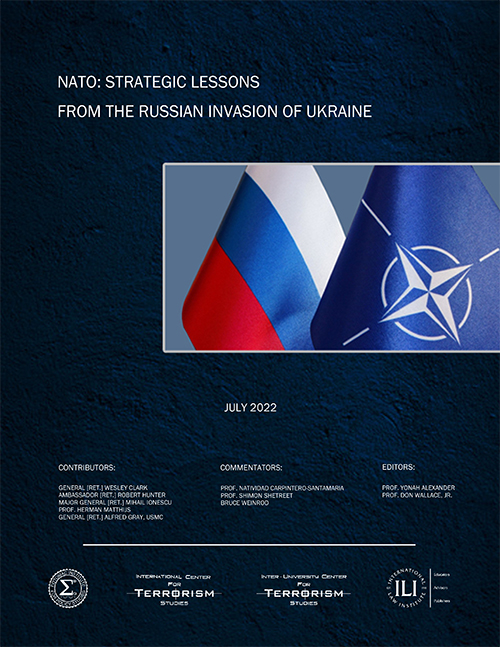 Recorded history has repeatedly provided tactical and strategic lessons on the nature of political relations within, between, and among nations. Numerous universal postulates for the conduct of statecraft have been offered by philosophers, politicians, scholars, and other observers reflecting on the experiences of diverse societies regarding what does and does not work.
Recorded history has repeatedly provided tactical and strategic lessons on the nature of political relations within, between, and among nations. Numerous universal postulates for the conduct of statecraft have been offered by philosophers, politicians, scholars, and other observers reflecting on the experiences of diverse societies regarding what does and does not work.
These collective insights focus on the perceived realities of national, regional, and global matters, including the role of history, the supremacy of self-interest, the cost of wars, and the benefits of peace. Other views deal with the nature of diplomacy in the struggle for power, and the value of multinational alliances in securing a stable world order based on the rule of law, the protection of human rights, and the advancement of economic progress and prosperity.
As NATO, the North Atlantic Treaty Organization, celebrates more than 70 years of existence, it remains the most significant defensive alliance in the past two centuries. In early 2022, its 30 nation-state members are still facing a broad range of old and new horizontal and vertical challenges. These include piracy, terrorism, regional conflicts, humanitarian crises, proliferation of weapons of mass destruction (WMDs), and cyber threats.
Moreover, NATO’s three core tasks, namely, deterrence and defense; crisis prevention management; and cooperative security are being critically tested during the Russian Federation war of aggression launched against Ukraine, a non-member independent country in the Euro-Atlantic region.
It is against this background that NATO has acknowledged Russia as its greatest direct security threat. The alliance announced its intention to defend “every inch” of its members’ territory. Additionally, Finland and Sweden have officially been invited to join the alliance. Other significant strategic measures have been adopted at the Madrid Summit Declaration on June 29, 2022.
The current report “NATO Strategic Lessons From the Russian Invasion of Ukraine” (July 2022) held as a Zoom Forum on April 28, 2022 focuses on the above developments and looking forward. This virtual Forum began with opening remarks by Professor Don Wallace Jr. (Chairman, International Law Institute) and was moderated by Professor Yonah Alexander (Director of the International Center for Terrorism Studies and Senior Fellow at the Potomac Institute for Policy Studies). The following distinguished panel of scholars and practitioners gave presentations and subsequent discussion; General (Ret.) Wesley Clark (Former Supreme Allied Commander Europe); Ambassador (Ret.) Robert Hunter (Former U.S. Ambassador to NATO); Major General (Ret.) Dr. Mihail E. Ionescu (Professor, National School of Political and Administrative Studies (SNSPA) Bucharest, Romania); Professor Herman Matthijs (University Ghent & Free University Brussels); Professor Natividad Carpintero- Santamaria (Professor at the Polytechnic University of Madrid (UPM) and General Secretary of the Instituto de Fusión Nuclear “Guillermo Velarde”); Professor Shimon Shetreet (Greenblatt Chair of Public and International Law, Hebrew University of Jerusalem; Former Cabinet Minister and MK, Israel); and Bruce Weinrod (Former Secretary of Defense Representative for Europe and former Deputy Assistant Secretary for European and NATO Policy. Closing remarks were delivered by General (Ret.) Alfred Gray, USMC (29th Commandant of the U.S. Marine Corps (1987-1991); Chairman of the Board of Directors and Regents, Potomac Institute for Policy Studies).
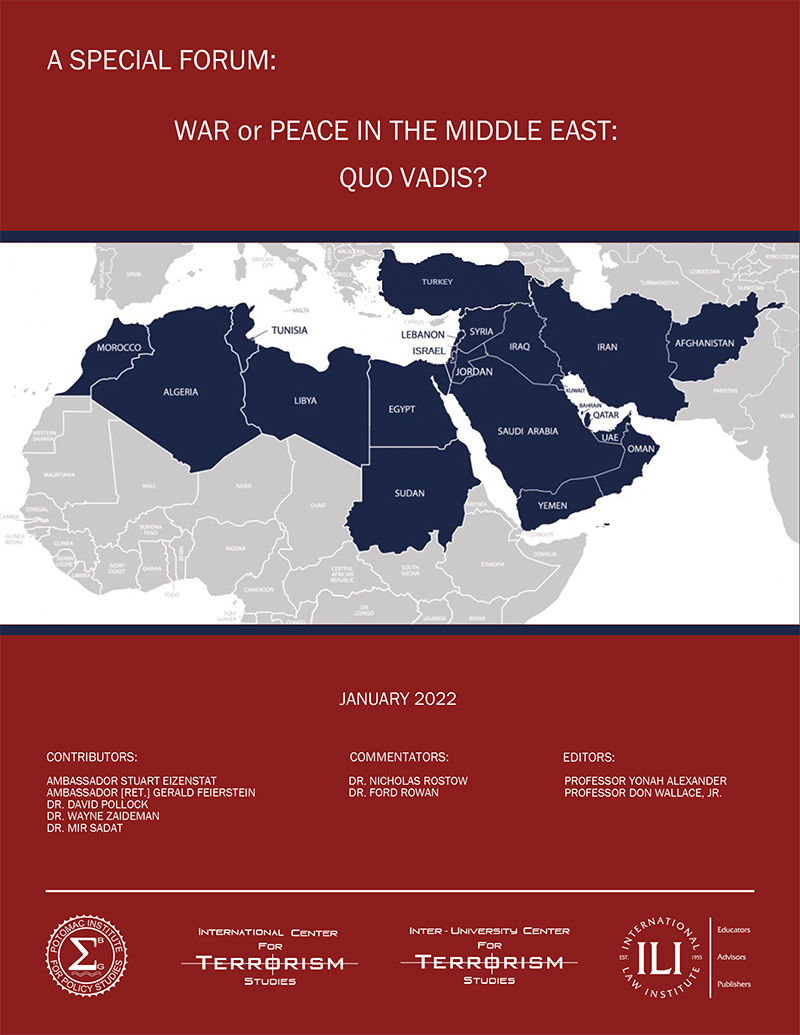 As we are entering 2022, the world once again has been facing an alarming upsurge of threats to peace in the form of terrorism, insurgencies, and outbreaks of full-scale wars. Some of the expanding manifestations of violence have been aggravated by ideological extremism, nationalistic fanaticism, ethnic hatred, racial prejudices, religious animosities and justified in the name of “rights,” “justice” and even “peace.”
As we are entering 2022, the world once again has been facing an alarming upsurge of threats to peace in the form of terrorism, insurgencies, and outbreaks of full-scale wars. Some of the expanding manifestations of violence have been aggravated by ideological extremism, nationalistic fanaticism, ethnic hatred, racial prejudices, religious animosities and justified in the name of “rights,” “justice” and even “peace.”
The current security challenges amid the relenting Covid-19 pandemic include the renewed Palestinian-Israeli hostilities in Gaza, the raging conflicts throughout the region in Syria, Iraq, Yemen, Libya, as well as Iran’s continuing terrorism threats and nuclear ambitions.
The stopping of the unfolding violence and building a lasting peace is critical. Thus, the academic community has an obligation to participate in the international effort to advance the cause of peace in the Middle East and elsewhere.
In this connection it is important to note several relevant studies that were undertaken over the years. First is a book titled Crescent and Star: Arab and Israeli Perspectives on the Middle East Conflict edited by Yonah Alexander and Nicholas N. Kittrie and published by AMS Press in New York and Toronto in 1973. This volume focused on various questions that underlie the regional and global challenges. Some of the issues addressed were the following: a conflict between two antagonistic nationalisms; religious and ethnical tensions; violations of minority and human rights; expansionism and boundary disputes; conflict over the control of Jerusalem and the Holy Places; hostilities concerning the use of the Jordan River and freedom of navigation in the Gulf of Aqaba and Suez Canal; a competition among world powers.
The second academic effort was a study on The Role of Communications in the Middle East Conflict: Ideological and Religious Aspects by Yonah Alexander that was released by Praeger Publishers (New York, Washington, London) in 1973. This volume was conducted as part of a larger project on the role of mass communication in the advancement of international understanding sponsored by the Graduate School of Journalism at Columbia University. The main questions which were analyzed included the following:
First, is the confrontation between Arab nationalism and Zionism inevitable and therefore insurmountable? Or does it indicate a certain historical stage between Arabs and Israeli Jews and is likely to disappear?
Second, are the antagonists and their partisans using religion-based communications to fan the flames of conflict and thereby advance the cause of war? To what extent do they dampen the passion of strife and consequently promote the cause of peace?
Third, can religion serve as a more effective tool for peace communications and help to ease the frictions and lessen the tension in the Middle East and beyond?
Another relevant work is Palestinian Religious Terrorism: Hamas and Islamic Jihad authored by Yonah Alexander and released by Transnational Publishers in Ardsley, New York in 2002. This particular book exposes much of the mystique of these organizations and places them as two of the many other challenges facing not only Israel but also the entire international community in its war against terrorism, whether it is waged in the Middle East or elsewhere.
In addition to the forgoing studies, the Inter-University Center for Terrorism Studies (IUCTS), organized numerous other academic research activities. Suffice to mention the publication of multiple selected books since 9/11 including: Usama bin Laden’s al-Qaida: Profile of a Terrorist Network (Brill Nijhoff, 2001) by Yonah Alexander and Michael S. Swetnam; The New Iranian Leadership: Ahmadinejad, Terrorism, Nuclear Ambition, and the Middle East (Praeger, 2007) by Yonah Alexander and Milton Hoenig; Al-Qa'ida: Ten Years After 9/11 and Beyond (Potomac Institute Press, 2012) by Yonah Alexander and Michael S. Swetnam; The Islamic State: Combating the Caliphate Without Borders (Lexington Books, 2015) by Yonah Alexander and Dean Alexander.
Among the other numerous reports released by the IUCTS include: “Arab Spring: A Year Later and Beyond” (March 2012); “Combating Hizballah’s Global Network” (October 2013); “Tehran’s Bomb Challenge: Crossroads, Roadblocks, and Roadmaps to Rapprochement?” (March 2014); “Israeli- Palestinian Peace Process: Endless or Endgame?” (July 2014); “Combating the Islamic State: Is a New Strategic Blueprint Needed?” (January 2016); “Russia’s Strategic Puzzle: Past Lessons, Current Assessment, and Future Outlook” (March 2016); “Syria: Quo Vadis?” (October 2015); “The Holy Jerusalem: A Key to Middle East War or Peace?” (December 2016); “Terrorism in North Africa and the Sahel in 2016” (March 2017); “Preventing WMD Terrorism: Ten Perspectives” (August 2017); “The Role of Diplomacy in Combating Terrorism: Selected Perspectives” (March 2018); “Biological Terrorism: International Dimensions” (June 2019).
As the Covid-19 pandemic emerged in early 2020, our colleagues at the International Law Institute (ILI) and the Potomac Institute for Policy Studies (PIPS) organized a Special Ambassadors’ Forum on the “Middle East Security Challenges: Past Lessons and Future Outlook” held on February 6, 2020 at the International Law Institute in Washington, DC.
This event featured Ambassador Stuart Eizenstat, a four decades-long policy maker, diplomat, scholar, attorney, and author who discussed his highly acclaimed book President Carter: The White House Years (St. Martin’s Press, 2018). The video of the entire program is accessible here:
.It is our honor to incorporate Ambassador Eizenstat’s contribution in the current report, “War or Peace in the Middle East: Quo Vadis?” We are including a selection of Ambassador Eizenstat’s remarks related to the Middle East prior to incorporating our colleagues’ presentations from the July 22, 2021 event.
The program of this event began with opening remarks by Professor Don Wallace (Chairman, International Law Institute). The virtual Forum was moderated by Professor Yonah Alexander (Director of the International Center for Terrorism Studies and Senior Fellow at the Potomac Institute for Policy Studies). Presentations and discussion were offered by Ambassador (Ret.) Gerald Feierstein (Senior Vice President, Middle East Institute); Dr. David Pollock (Bernstein Fellow, The Washington Institute); Dr. Wayne Zaideman (Retired Special Agent and Legal Attaché at the FBI, Middle East); Dr. Mir Sadat (Former Policy Director, U.S. National Security Council); Dr. Nicholas Rostow (Senior Research Scholar, Yale Law School); Dr. Ford Rowan (Chairman of the National Center for Critical Incident Analysis).
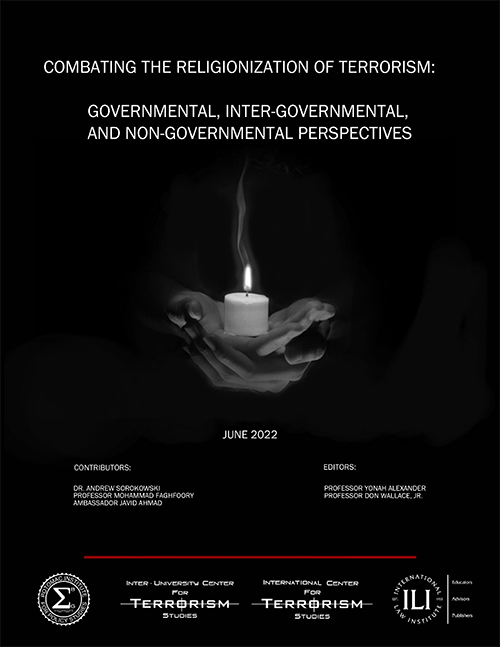 The history of mankind from time immemorial to the modern era consists of overwhelming evidence that multiple dogmas of religious denominations have contained various manifestations of hatred and violence towards other perceived antagonistic believers. For instance, in the 1990s religious self-righteousness and within and among nations around the globe.
The history of mankind from time immemorial to the modern era consists of overwhelming evidence that multiple dogmas of religious denominations have contained various manifestations of hatred and violence towards other perceived antagonistic believers. For instance, in the 1990s religious self-righteousness and within and among nations around the globe.
Suffice to mention, the exploitation of religious symbols and concepts to advance radical political agendas in places such as Northern Ireland, Nigeria, and India.
Furthermore, the informal and formal network among different sub-state and state-sponsors has created a structure to promote terrorism on national, regional, and global levels. This modern political framework has consisted of many forms: theological alliances; organizational assistance; propaganda and psychological warfare; financial help; recruitment support; intelligence systems; supply of weapons; training; coordinated operational missions; and sanctuary availability.
To be sure, other various disciplinary factors have also directly and indirectly contributed to seemingly endless cases of brutality and bloodshed. These elements include, inter alia, ethnic, racial, and tribal intolerance and violence; extreme nationalism and separatism; regional and inter-regional conflicts that defy easy solutions; intensification of criminal activity; population explosion, migration expansion, and rising poverty; the widening economic gap between North and South; environmental challenges; expanding health security concerns; and proliferation of modern weapon technologies.
And yet, as we have entered the 21st century, a promising contemporary trend of inter-faith relations has envisioned a renewed ecumenical trend, reflecting the minimization of religious confrontations and maximizing cross-theological cooperative efforts. For instance, a Millennium World Peace Summit held in New York formed an organizational structure of religious leaders to advise the United Nations on preventing and settling political disputes stemming from traditional religious animosities.
Alas, this and other similar hopeful efforts have been derailed by the tragedy of 9/11 and the continued rise of theological-inspired state and non-state terrorism, insurgencies, and wars during the past two decades.
In view of the current Russian invasion of Ukraine, a key question is whether any potential inter-faith initiatives can contribute, however modestly, in the search for peace with justice regionally and globally?
At this stage of deepening security uncertainties, two encouraging flickering lights in the “fog of war” should be noted for future analytical considerations. The first is a May 2022 gathering of world religious leaders in Saudi Arabia that uniquely demonstrated a major inter-faith effort.
The Muslim World League organized the first-ever “Forum on Common Values among Religious Followers” in Riyadh. Invited delegates from Muslim, Christian, Jewish, and other religious denominations participated in establishing and outlining fundamental agreements in advancing the cause of peace.
A communique issued by the Saudi organizers stated that, “the Forum’s collective objectives were to reach a universal consensus between global spiritual leaders, leverage their commonalities by placing them at the forefront of human values, effectively support efforts to advance tolerance and peace, and set rational intellectual-frameworks to immunize against the dangers of extremist ideology and behavior regardless of its source.”
The communique also included areas of agreements for religious policy that were reached at the gathering, including the fundamental role of religion in society, the spiritual basis for basic human rights, and a rejection of an “inevitable civilizational clash” among religions. Notably, the Archbishop of the Orthodox Church of Ukraine Ivan Zoria also attended this event.
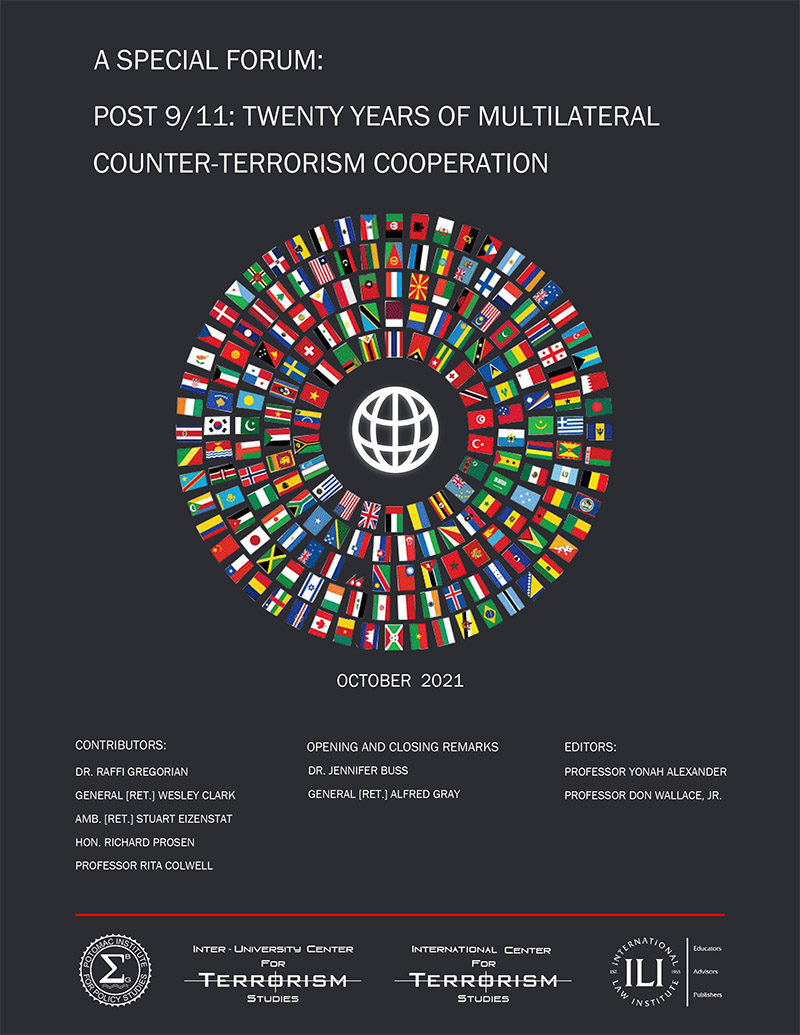 The resort of force and violence by state and non-state actors in the struggle for power within and among nations is as old as history itself. Both the strong and the weak have deployed modus operandi capabilities ranging from primitive to modern technologies with profound consequences to the security concerns to the global system.
The resort of force and violence by state and non-state actors in the struggle for power within and among nations is as old as history itself. Both the strong and the weak have deployed modus operandi capabilities ranging from primitive to modern technologies with profound consequences to the security concerns to the global system.
It is not surprising therefore that two decades after 9/11, terrorism from above and below still continues to cast a worrisome arc of instability and political conflicts over many countries and regions of the world. The debate in democracies over the need to craft effective responses to domestic and international terrorism focuses inter alia on realpolitik coupled with moral and human rights considerations.
For instance, since 9/11 expanded state power in the Unites States, these have included policies such as “Global War on Terror”, “Overseas Contingency Operations”, and other strategic and tactical approaches authorizing the use of military force internally and externally. Additionally, the European Union developed key roadmaps and toolkits for combating terrorism and securing the national interests of member-states (e.g., prevent, pursue, prosecute, punish, persuade, and protect).
Most recently, the United Nations that began its annual General Assembly session in September 2021, has placed discussion items on its agenda regarding combating and eliminating terrorism as well as maintaining international peace and security.
Mindful of the past and current security concerns, effective multilateral counter-terrorism cooperation requires increased international alliances of like-minded nations through diplomacy and other measures in responding successfully to potential conventional and non-conventional terrorist threats in the remainder of the 21st Century.
In this context, the Inter-University Center for Terrorism Studies (IUCTS), the Potomac Institute for Policy Studies (PIPS), the International Law Institute (ILI), and other academic partners organized the virtual academic Forum on “Post 9/11: Twenty Years of Multilateral Counter-Terrorism Cooperation” held on September 09, 2021.1 The program of this event began with opening remarks by Professor Don Wallace, Jr. (Chairman of the International Law Institute) and Dr. Jennifer Buss (CEO, Potomac Institute for Policy Studies). The virtual Forum was moderated by Professor Yonah Alexander (Director of the International Center for Terrorism Studies). Presentations and discussion were by Dr. Raffi Gregorian (Deputy to the Under- Secretary-General & Director, United Nations Office of Counter-Terrorism), Gen. (Ret.) Wesley Clark (Former NATO Supreme Allied Commander), Amb. (Ret.) Stuart Eizenstat (Former Senior Official with Three US Administrations and Ambassador to the European Union), Hon. Richard Prosen (Deputy Director, Office of Multilateral Affairs, Bureau of Counterterrorism, U.S. Department of State), and Distinguished University Professor Rita Colwell (University of Maryland, College Park; Johns Hopkins University, Bloomberg School of Public Health). Closing remarks were delivered by Gen. (Ret.) Alfred Gray (29th Commandant of the U.S. Marine Corps (1987-1991) and Chairman of the Board of Directors and Regents, Potomac Institute for Policy Studies). This event is the latest Forum on inter-disciplinary health and security threats mounted within the academic framework of 2021 programs.

